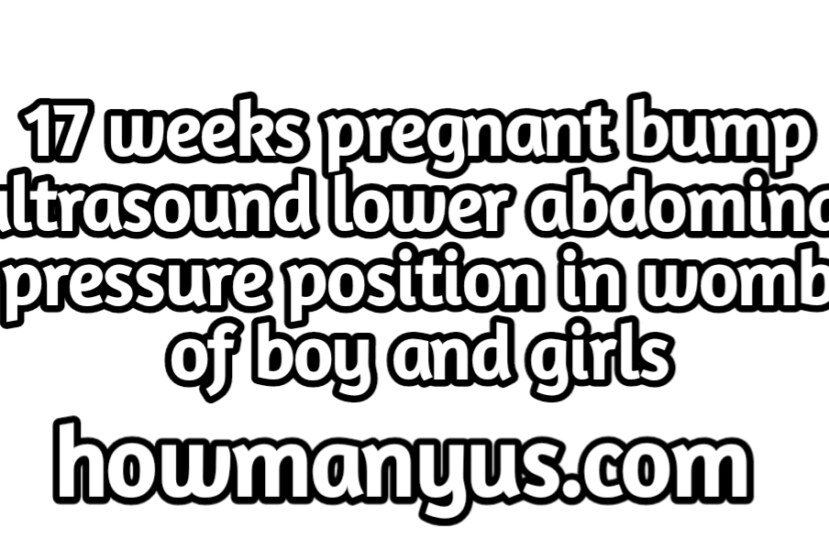17 weeks pregnant bump
At 17 weeks pregnant, it’s common for a woman to start showing a noticeable baby bump. However, the size and shape of the bump can vary depending on various factors, including the woman’s body type, the position of the baby, and the number of previous pregnancies.

Typically, at 17 weeks pregnant, the uterus will have risen above the pelvic bone and will be roughly the size of a small melon. This growth in size and height may make the baby bump more visible and noticeable, especially for women who have a smaller build.
It’s important to remember that every pregnancy is unique, and the size and shape of the baby bump can vary widely. If you have any concerns about the size of your baby bump or your pregnancy in general, it’s always best to consult with your healthcare provider. Read more 18 weeks pregnancy all information
Where is baby located at 17 weeks
At 17 weeks pregnant, the baby is located inside the uterus, which is now positioned above the pelvic bone and has grown to be roughly the size of a small melon. The baby itself is about 5 inches (13 cm) long from crown to rump and weighs around 5 ounces (140 grams).
The baby’s organs, muscles, and nerves are starting to function and coordinate with each other. The baby is also developing bones that are becoming harder, and the skin is starting to develop a layer of fat to help regulate body temperature. The baby is surrounded by amniotic fluid, which provides cushioning and protection as well as a watery environment for the baby to move and grow.
By this stage of pregnancy, the baby’s gender may be identifiable through ultrasound, and the baby will be moving and kicking more frequently. The mother may be able to feel these movements, especially if she has had a previous pregnancy.
17 week pregnancy ultrasound
At 17 weeks pregnant, a routine ultrasound may be performed to assess the growth and development of the baby. The ultrasound can provide a lot of information about the baby’s health and can also reveal the baby’s gender if desired.
During the ultrasound, the healthcare provider will use a handheld device called a transducer that emits high-frequency sound waves. The sound waves bounce off the baby and create an image on a computer screen.
Some of the things that can be seen during a 17-week ultrasound include:
- The baby’s size and weight
- The position of the baby in the uterus
- The baby’s heart rate and rhythm
- The baby’s organs, such as the brain, heart, lungs, kidneys, and liver
- The baby’s arms, legs, fingers, and toes
- The amount of amniotic fluid surrounding the baby
- The placenta and umbilical cord
here is 17 weeks pregnancy ultrasound video… See this
The ultrasound can also identify any potential abnormalities or problems with the pregnancy. If any issues are detected, further testing or monitoring may be recommended.
It’s important to note that not all healthcare providers routinely offer ultrasounds at 17 weeks, and some may wait until a later point in the pregnancy to perform an ultrasound.
17 weeks pregnant symptoms of boy
There are no specific symptoms of carrying a boy or a girl during pregnancy, and many of the symptoms experienced during pregnancy are similar regardless of the baby’s gender.
Some common symptoms experienced by women at 17 weeks pregnant may include:
- Fatigue: Many women experience fatigue during the first and second trimesters of pregnancy, regardless of the baby’s gender.
- Nausea: Morning sickness, nausea, and vomiting can occur in the first trimester and may continue in the second trimester.
- Food cravings and aversions: Pregnant women may have strong cravings for certain foods or aversions to others, which can vary widely from person to person.
- Increased appetite: Many women find that they are hungrier than usual during pregnancy.
- Mood swings: Hormonal changes during pregnancy can cause mood swings and emotional changes.
- Headaches: Headaches are common during pregnancy due to hormonal changes, stress, and other factors.
- Braxton Hicks contractions: These are practice contractions that occur throughout pregnancy and can become more frequent later on.
- Round ligament pain: This is a sharp pain or pulling sensation in the lower abdomen or groin caused by the stretching of the round ligaments that support the uterus.
It’s important to remember that symptoms can vary widely from person to person and pregnancy to pregnancy. The best way to determine the baby’s gender is through an ultrasound or genetic testing.
17 weeks pregnant symptoms of girl
There are no specific symptoms of carrying a girl or a boy during pregnancy, and many of the symptoms experienced during pregnancy are similar regardless of the baby’s gender.
Some common symptoms experienced by women at 17 weeks pregnant may include:
- Fatigue: Many women experience fatigue during the first and second trimesters of pregnancy, regardless of the baby’s gender.
- Nausea: Morning sickness, nausea, and vomiting can occur in the first trimester and may continue in the second trimester.
- Food cravings and aversions: Pregnant women may have strong cravings for certain foods or aversions to others, which can vary widely from person to person.
- Increased appetite: Many women find that they are hungrier than usual during pregnancy.
- Mood swings: Hormonal changes during pregnancy can cause mood swings and emotional changes.
- Headaches: Headaches are common during pregnancy due to hormonal changes, stress, and other factors.
- Braxton Hicks contractions: These are practice contractions that occur throughout pregnancy and can become more frequent later on.
- Round ligament pain: This is a sharp pain or pulling sensation in the lower abdomen or groin caused by the stretching of the round ligaments that support the uterus.
It’s important to remember that symptoms can vary widely from person to person and pregnancy to pregnancy. The best way to determine the baby’s gender is through an ultrasound or genetic testing.
How do I know my baby is OK at 17 weeks?
There are a few ways to determine if your baby is doing well at 17 weeks of pregnancy:
- Regular prenatal check-ups: Regular prenatal check-ups with your healthcare provider are crucial during pregnancy to monitor your baby’s growth and development. At each appointment, your healthcare provider will measure your uterus, check your baby’s heartbeat, and ask about any symptoms or concerns you may have.
- Fetal movement: You may start feeling your baby move around 17 to 20 weeks, and feeling these movements can be reassuring that your baby is doing well. You can keep track of your baby’s movements by doing kick counts, where you note how long it takes for your baby to move 10 times.
- Ultrasound: An ultrasound can provide a detailed look at your baby’s growth and development and can help detect any potential issues. If your healthcare provider recommends an ultrasound, it’s important to follow their advice.
- Your own symptoms: Generally, if you are feeling well and not experiencing any concerning symptoms, such as severe cramping, vaginal bleeding, or fever, it’s likely that your baby is doing well too. However, it’s important to always discuss any symptoms or concerns with your healthcare provider.
Remember, every pregnancy is unique, and it’s normal to have some worries and concerns. If you have any questions or concerns about your pregnancy, it’s important to talk to your healthcare provider.
Is 17 weeks considered 4/5 months pregnant?
Yes, 17 weeks is considered 4 months and about 1 week pregnant. Pregnancy is typically measured in weeks, and a full-term pregnancy is considered to be 40 weeks or 9 months and 1-2 weeks.
Here’s a breakdown of the months and weeks of pregnancy:
- 1-4 weeks: 1 month
- 5-8 weeks: 2 months
- 9-12 weeks: 3 months
- 13-16 weeks: 4 months
- 17-20 weeks: 5 months
- 21-24 weeks: 6 months
- 25-28 weeks: 7 months
- 29-32 weeks: 8 months
- 33-36 weeks: 9 months
- 37-40 weeks: 9 months and 1-2 weeks (full term)
It’s important to keep in mind that these are rough estimates, and every pregnancy is different. Your healthcare provider will use ultrasound and other methods to monitor your baby’s growth and development throughout your pregnancy.
17 weeks pregnant baby position in womb
At 17 weeks pregnant, your baby is likely to be positioned in the upper part of your uterus, near your belly button. However, it’s important to remember that every pregnancy and every baby is different, and the position of the baby can vary.
During the second trimester, your baby is still relatively small and has plenty of room to move around in the uterus. As your pregnancy progresses and your baby grows, they will begin to run out of room, and their movements may feel more restricted.
By around 20 weeks, your healthcare provider may be able to determine your baby’s position during a routine ultrasound. However, some babies may be more difficult to see clearly depending on their position in the uterus.
If you have any concerns about your baby’s position or movements, it’s important to discuss them with your healthcare provider. They can monitor your baby’s growth and development and provide guidance on what to expect during the rest of your pregnancy.
17 week pregnancy symptoms
At 17 weeks pregnant, you may experience a variety of symptoms as your body adjusts to the changes of pregnancy. Some common symptoms at this stage may include:
- Growing belly: Your belly will continue to grow as your baby does, and you may start to feel more movement as your baby becomes more active.
- Fatigue: Many women experience fatigue during the first and second trimesters of pregnancy due to hormonal changes and the physical demands of growing a baby.
- Morning sickness: Nausea and vomiting may start to subside by 17 weeks, but some women may continue to experience morning sickness into the second trimester.
- Food cravings and aversions: Many pregnant women have strong cravings for certain foods and aversions to others.
- Heartburn and indigestion: As your uterus expands, it can put pressure on your stomach and cause heartburn and indigestion.
- Constipation: Hormonal changes during pregnancy can slow down digestion and cause constipation.
- Round ligament pain: You may experience a sharp pain or pulling sensation in your lower abdomen or groin as your round ligaments stretch to accommodate your growing uterus.
- Mood swings: Hormonal changes during pregnancy can cause mood swings and emotional changes.
It’s important to remember that every pregnancy is unique, and symptoms can vary widely from person to person. If you have any concerns about your symptoms or your pregnancy, it’s important to discuss them with your healthcare provider.
17 weeks pregnant is how many months
At 17 weeks pregnant, you are 4 months and about 1 week pregnant. Pregnancy is typically measured in weeks, and a full-term pregnancy is considered to be 40 weeks or 9 months and 1-2 weeks.
Here’s a breakdown of the months and weeks of pregnancy:
- 1-4 weeks: 1 month
- 5-8 weeks: 2 months
- 9-12 weeks: 3 months
- 13-16 weeks: 4 months
- 17-20 weeks: 5 months
- 21-24 weeks: 6 months
- 25-28 weeks: 7 months
- 29-32 weeks: 8 months
- 33-36 weeks: 9 months
- 37-40 weeks: 9 months and 1-2 weeks (full term)
It’s important to keep in mind that these are rough estimates, and every pregnancy is different. Your healthcare provider will use ultrasound and other methods to monitor your baby’s growth and development throughout your pregnancy.
17 weeks pregnant belly
At 17 weeks pregnant, your belly is likely to be noticeably larger than it was in earlier weeks of pregnancy. Your uterus is growing to accommodate your developing baby, and as a result, your belly will gradually become more rounded and pronounced.
By this point, you may also start to feel some movement from your baby, which can feel like fluttering or gas bubbles in your abdomen. As your baby continues to grow and become more active, these movements will become more frequent and pronounced.
It’s important to remember that every pregnancy is unique, and the size and shape of your belly can vary depending on factors like your height, weight, and the position of your baby in the uterus. If you have any concerns about your belly size or your pregnancy in general, it’s important to discuss them with your healthcare provider.
17 weeks pregnant lower abdominal pressure
At 17 weeks pregnant, it’s not uncommon to experience some lower abdominal pressure or discomfort as your uterus continues to grow and expand. As your baby grows, the uterus puts pressure on the surrounding organs and tissues, which can cause sensations of heaviness or pressure in the lower abdomen.
However, it’s important to note that some amount of discomfort or pressure can be normal during pregnancy, but it’s also important to be aware of any other symptoms that may indicate a problem. If you experience severe or persistent pain, bleeding, or other concerning symptoms, it’s important to contact your healthcare provider right away.
Additionally, if you experience any sudden or severe abdominal pain, it’s important to seek medical attention immediately, as this could be a sign of a serious condition such as an ectopic pregnancy or miscarriage.
If you have concerns about your symptoms or your pregnancy, it’s always a good idea to discuss them with your healthcare provider to ensure the health and safety of you and your baby.
Conclusion: 17 weeks pregnant
At 17 weeks pregnant, you are in the second trimester of pregnancy and your baby is growing and developing at a rapid pace. Your baby is now about the size of a pomegranate and may be around 5.1 inches long and weigh about 5.9 ounces. Your baby’s bones are beginning to harden, and the circulatory and urinary systems are functioning.
As for you, you may be experiencing a variety of symptoms such as fatigue, growing belly, food cravings, heartburn, constipation, mood swings, and round ligament pain. You may also start to feel your baby move, which can feel like fluttering or gas bubbles in your abdomen.
It’s important to continue to take care of yourself and your growing baby by eating a healthy and balanced diet, staying hydrated, getting enough rest, and attending all of your prenatal appointments. If you have any concerns about your symptoms or your pregnancy, don’t hesitate to speak with your healthcare provider.





Leave a comment